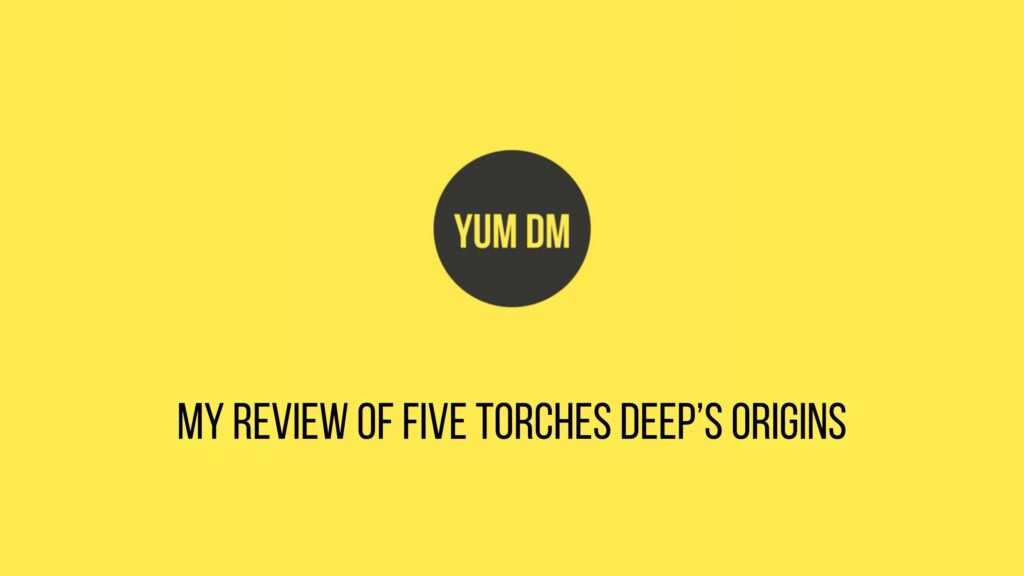
Before I start this review I want you to know I am a big fan of Five Torches Deep and all past supplements (I even ran a FTD Fan Page on Facebook at one stage, and have created a complete proficiency list). The base game was a breath of fresh air when I needed one (being over 5e) and the past supplements have been really good additions to the base game.
Five Torches Deep: Origins is a mixed bag.
On the one hand, you have some neat ideas and multiple ways to approach race in D&D – all packaged up in one supplement. And these could easily be ported into most editions of the game with a little effort (although some would change the nature and feel of the game).
On the other, you have a supplement that seems to be one large apology for making Five Torches Deep in the first place.
Which, as a fan, I find jarring.
But more on that a little later.
The Good About Five Torches Deep: Origins
From a gaming mechanic standpoint, this supplement adds quite a few novel (and old) ideas for races that you can use in your game.
You can think about this supplement as a tool box you can come to when you are creating your campaign world or thinking about how you want to handle race in your game.
At its heart, this supplement is a toolbook of ideas on tackling race in your D&D game.
It even goes so far to add a fair amount of oddball races into the mix. For example, you could play undead or a creature with a third arm or leg.
If you are into that, then this book may appeal.
(Personally, I am not, so those parts left me rolling my eyes a little and glossing over them. I prefer my fantasy to be more grounded and less odd-ball.)
The meat and potatoes of Origins is showcasing four different ways to incorporate race into your game.
These are:
- Ancestries
- Life Paths
- Lineages
- Paragons
Like all Five Torches Deep books, they tend to use their own language and so all of these are familiar concepts to folk who have been around for a while and/or have played a lot of different roleplaying games.
Ancestries are basically packages you take, and depending on which you choose, you get various traits. This is the closest you get to a traditional race.
So, if you take the Elf ancestry, you get the following:

All the basic races are covered: elf, dwarf, halfling, human; plus a few familiar ones with the serial numbers filed off, like wyrmkin (for dragonborn); and some truly unique ones, like eternal ancestry (you are undead) and the corpseflea ancestry (you are a “…parasitic wisp of energy that inhabits the corpse…”)
With Life Paths you get to roll randomly for what happened to your character as they grew up. Basically a simpler and much quicker version of Pathfinders 2 character generation system.
I liked this one, but you would need to expand on the tables pretty quickly less you get similar results for a party of six characters.
Lineages are basically a mix of natural and cultural traits all bundled together, but you choose which two you want. And these can be considered a race in the traditional sense, just an off-shoot of a larger race, or just based on an individual.
An example of a Lineage Traits:

These traits are based largely on physical traits, like Dense Bones, Third Leg, Little, Strong, and Undead.
There are some wacky choices here which some DMs (like myself) wouldn’t allow in their campaigns – like the aforementioned Undead.
Some examples of Lineage Culture:

By simply combining one from each – trait and culture – you have yourself a race.
Finally, Paragons are simply race-as-class, which are “archetypal champions of their people.”
All of this gives some good variety and allows you to construct the races as you want and gives you some good foundations on which to build on.
The Bad About Five Torches Deep: Origins
Before I continue, I do have to say that I personally don’t think ‘race’ in D&D is a dirty word and I don’t think having racial ability modifiers (both positive and negative) associated with some races is inherently racist.
The whole book seems to read as an apology for creating Five Torches Deep.
That’s the feeling I get after reading it.
Well, two parts in particular, but they cloud the rest of the book. So much so that I feel they take away somewhat from what good there is.
I also get the feeling that if Five Torches Deep was made today it would be a completely different game (and one I don’t think I would be as big a fan of).
I do wonder why the creators of Five Torches Deep keep the game alive given how they obviously feel about it.
The big elephant in the room is the last page.
Here you find a large spiel about how classic roleplaying games are inherently racist and that killing monsters is wrong.
They go on to say that the whole killing-monsters-taking-their-treasure trope is colonialism at its worst and that it shouldn’t be there.
They do fail to mention how the monsters got the treasure in the first place (hint: probably from the same people who are trying to take it back. Dragons don’t print coins, they steal them).
This last page diatribe was the first part I read after it having caught my eye after printing the book out and it clouded an otherwise useful book.
They could have left this out of the book altogether and it would have made it better.
As a fan, all of this doesn’t really sit well with me as one of the reasons I love (loved?) Five Torches Deep was that it wasn’t 5e and (at the time) seemed to keep away from stuff like this.
I also think this isn’t helped by the change in artwork style.
Art Style
One of the appeals of Five Torches Deep was it was dark and broody, which matched perfectly the deadly nature of the game.
In complete juxtaposition, the artwork in Origin is cheesy and cartoonish – a real jarring difference. And one that left me wondering if I was reading a supplement for the same game.
The other major change is how they see and treat ability scores.
Ability Scores
Basically, ability scores now only represent your character in respect to a particular check, and does not represent how your character actually is.
Meaning you aren’t dumb if you have a 5 Int, it’s just that you were confused at the time of making a check.
A low strength doesn’t equate to your character being physically weak, instead you were simply “cursed with tough foes or awful luck” at the time.
This is an interesting, but ultimately flawed, take and seems to go against the main Five Torches Deep rulebook.
There are a few things in D&D that truly define a character, and one of the main ones are the ability scores. And while these aren’t comprehensive, they are relatable and easily understood.
Like most of D&D, they are shorthand ways of expressing what your character is like. Having a low ability means you aren’t as good as someone else in that trait.
So what?
That doesn’t make you any less of a character. It makes your character more interesting and gives you something to work off.
If you have a constitution of 5 it could mean you were sickly as a child and barely survived, it could mean you had a terrible accident growing up, it could just mean you have bad genes and you are susceptible to disease and illness.
You can tell a lot about a character by their ability scores.
This also smacks of the idea that everyone is born equal. That everyone has the same chance of doing anything they want.
This is not true. Of real life or of character.
Some people (and species) are better at certain things than others.
Trying to obfuscate that behind rules that try really hard not to upset anyone is dishonest and lacks verisimilitude in a campaign world setting.
Embrace the differences. And celebrate them.
Conclusion
I still think Origins is worth the asking price, but ultimately it is such a large departure from their previous supplements, and Five Torches Deep itself, that it may come as a surprise to many fans.
Also, at the same time, it may attract new ones. Especially given the stance of the creators.
While You’re Here…
Since 2021 I have been publishing d12 Monthly, a monthly zine, which has a ton of articles for any edition of Dungeons and Dragons.
Printed copies are available in my store. The PDF is available on DriveThruRPG and you can get both, plus support my work, via my Patreon.
I will also be releasing some more products in the near future.
Feel free to reach out to me on Twitter or my contact page any time.

This is a great review and you really nailed the issues here. It’s bizarre when these companies jump on the bandwagon of torching everything fundmanetal to the game they’re making. If they think something as mundane as dungeon delving to slay monsters and take treasure is ‘problematic’, why are they even in this business to begin with? Grow a backbone and defend your own business, use common sense.
Cheers. Yeah, it all seems very odd to me. It’s a pity as the game had such a great start.